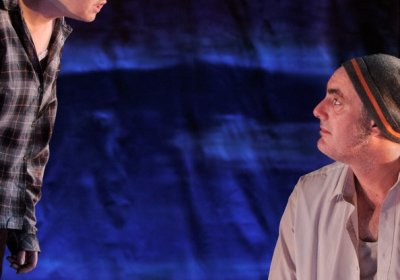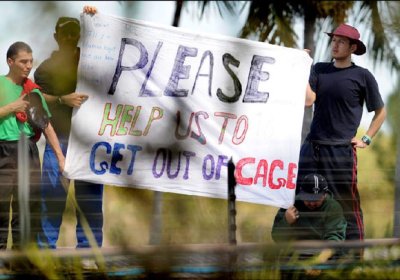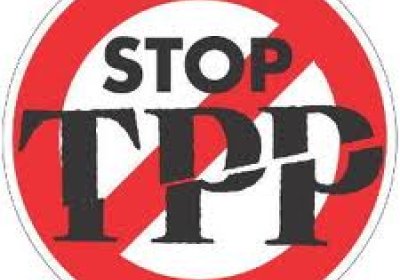An armed squad stormed the main office of Uthayan, a Tamil language daily newspaper published in the city of Jaffna in Sri Lanka's north, At 4.45am on April 13. The attackers set fire to the printing presses and copies of the paper that were ready for distribution.
The Tamilnet website said the squad was believed to be operated by Sri Lankan military intelligence. Jaffna, like other Tamil areas, is under military rule.
The attack is the fourth this year against Uthayan, which is owned by Tamil National Alliance (TNA) member of parliament E. Saravanapavan.
962
Chinese leaders are aware that visiting Western leaders will be under some pressure from their domestic constituencies to raise Tibet, human rights and other “sensitive” issues.
So a mechanism has been considerately created to cater for this need. It consists of a meaningless piece of theatre otherwise known as the “obligatory-behind-closed-doors-human-rights-discussion”.
According to the well-worn script, the elected foreign official heads to China on a trade mission, accompanied by a media circus and some high-level trough-snouting capitalists (like Andrew Forrest).
The truth about Anzac Day is that it is as much about denial as it is about remembrance. It is a denial that functions for both sides of the original conflict.
Last year, multi-award-winning playwright Angela Betzien undertook a three week residency in the Queensland town of Mt Morgan where she researched and developed a play exploring the impact of mining. Tall Man, a 50-minute two-hander, received standing ovations when it toured for one night only in three mining towns in Central Queensland.
“The play made us cringe and laugh,” said one Mt Morgan resident. “It challenged a room to acknowledge its story.”
Green left Weekly's Brianna Pike talked to Betzien about the play.
The federal government’s plan to cut $2.3 billion from university funding is wrong. The government should end public funding to private schools and make mining companies and banks pay instead.
It makes no sense for Julia Gillard’s government to fund primary and secondary education by cutting $2.3 billion from the budget of university education.
Described as a “razor-gang”, the cuts to universities will turn a student scholarship scheme into a loans scheme, disadvantaging thousands of students.
The NSW Coalition government’s decision to privatise two large ports was announced in July last year. It expected to receive $3 billion from the sale.
NSW Treasurer Mike Baird said on April 12 that the consortium NSW Ports would buy 99-year leases for two of the state’s international ports — Port Botany for $4.31 billion and Port Kembla for $760 million. The total cost of the sale would be $5.07 billion.
An additional yearly lease payment of $5 million would be paid to the government and the annual on cap container movement of 3.2 million would be abolished for Port Botany.
Hundreds of working-class people waiting outside of a closed grocery store for the possibility of getting the remaining food is not the picture of the “American Dream.” Yet on March 23, outside the Laney Walker Supermarket in Augusta, Ga., that is exactly what happened.
“We want our country to be alive. We don't want it to be dead because that’s our country, that’s our spirit country, we come from that country,” said Aboriginal traditional owner Teresa Roe to a crowd outside Woodside's office on April 12.
The gathering was a celebration after the announcement that Woodside Petroleum has shelved plan to build a liquid natural gas hub at James Price Point in Western Australia’s Kimberley.
N THE 60 years since the end of the Korean War, U.S. policy toward North Korea has fluctuated between the options of "containment" and "rollback."
Sometimes, the policy has shifted in the course of one presidency. Bill Clinton and George W. Bush both started out as advocates of rollback--regime change, either by military force or by provoking an internal collapse--but ended as caretakers of containment.
Ever since Malaysia was granted independence in 1957, the party that the British colonial rulers groomed and installed as their neo-colonial puppets, the United Malay National Organisation (UMNO), has clung on to power by hook or by crook.
At various points in history, UMNO (the central party in the governing Barisan Nasional (BN) ruling coalition) have relied on colonial military might, ethnic pogroms, jailing dissidents, media control, gerrymandering, vote rigging, corruption and patronage to stay in power.
Two years ago, refugee advocates learned five men detained in Darwin's Northern Immigration Detention Centre (NIDC) had sewn their mouths together and were protesting against delays to their cases. Advocates alerted the media of the self-harm in July, 2011.
But immigration spokespeople contacted by media denied lip-stitching had taken place. A spokesperson told AAP on July 2, 2011, that a detainee had been taken to hospital after an incident of self-harm, but: “Nobody has sewn their lips together.”
The Trans-Pacific Partnership Agreement has the potential to become the largest “free trade” deal in the world. Negotiations began in Melbourne in March 2010, involving Australia, Brunei Darussalam, Canada, Chile, Malaysia, Mexico, New Zealand, Peru, Singapore and the US. The combined GDP of these countries was about US$20.7 trillion in 2011. Japan is now close to being accepted into the negotiations.
- Previous page
- Page 2
- Next page



